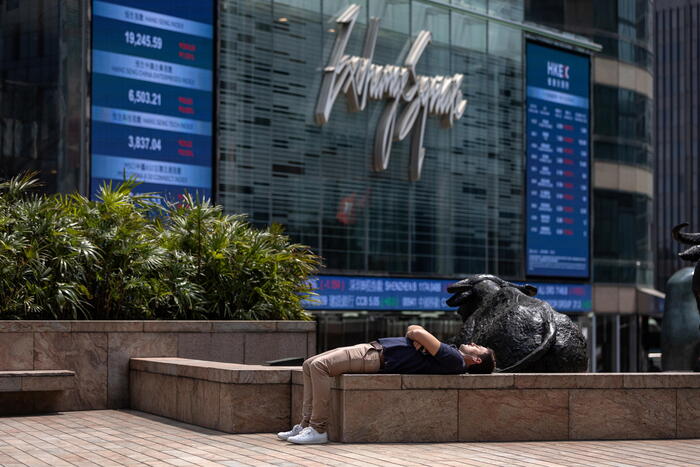01 view
Written by: Commentary Editing Room
2020-07-30 21:00
Last update date: 2020-07-30 21:00Affected by the new crown pneumonia, the Census and Statistics Department predicts that the GDP in the second quarter will fall by 9% year-on-year, which is not only worse than market expectations, but the Hong Kong economy has entered a contraction for four consecutive seasons. People stay home to fight the epidemic, and rapid economic shrinkage is inevitable. The government's primary task is to use its energy to control the epidemic, make good use of fiscal reserves, and consider formulating a new round of economic stimulus measures to pave the way for restarting economic activities.
Chen Maobo said that the local economy may take longer than originally expected to recover. (Profile picture)
According to the Census and Statistics Department, Hong Kong’s GDP in the second quarter fell 9.0% from the same period last year, slightly better than the 9.1% decline in the first quarter. Among them, private consumption expenditure and gross fixed capital formation fell significantly, down 14.5% and 20.6 respectively. %. In the face of the largest drop in private consumption expenditure in history, a government spokesperson stated that this “reflects the threat of COVID-19 and the requirements for social distancing have severely disrupted local consumer activities throughout the quarter, and foreign travel has also been caught in strict travel restrictions. "Pause", but the government also emphasized that as the May and June epidemics were largely under control, "the overall economic situation shows signs of stabilizing during the quarter."
Hong Kong is slightly better than Europe
Economic shrinkage is unavoidable during a pandemic, but the degree of difference between different economies is a hot topic. In the second quarter of the United States, GDP will plummet by 32.9%, the largest drop since records began in 1947. In the Eurozone on the other side of the Atlantic, the figure in the second quarter will also be as high as 11.8%. In contrast, although the situation in Hong Kong is not terrible, the severity is comparable to that of the euro zone, a region that has been hit hard by the epidemic, and there is not necessarily any "sign of stabilization."
The United States is in danger, and its flooding economic stimulus plan can be described as a negative example. In theory, since former US President Nixon abolished the gold standard, the US dollar, as the world’s only global reserve and clearing currency, has an influence comparable to the “exorbitant privilege” described by former French Finance Minister Valéry Giscard d'Estaing. privilege)——A bill with a face value of US$100 is actually "printed" at a very low cost. Not only does it have no gold worth about US$100 as collateral, but it is also possible to purchase goods worth US$100 globally. This is a disguised form Nearly zero-cost "interest-free lending." Therefore, whether it is the 2008 financial tsunami or the current new crown pneumonia, the Federal Reserve has stimulated the economy by increasing the money supply. Although it is called "quantitative easing," it actually borrows money from all over the world at a very low cost. Overdraft future life.
The problem is that quantitative easing has solved the throes of the financial tsunami, but it cannot save the current economy that has been hit hard. The reason is not the difference in policy strength, but the timing of the policy release much earlier than the full restart of economic activities. Although the status of the U.S. dollar allows Washington to spend trillions of government expenditures to hedge against the risk of economic downturn, because the epidemic in the United States has not been under control and is seeing a rebound, coupled with people's consumption and investment activities, it often depends It is based on expectations for the future, rather than the actual situation. Even after Washington opened up money printing machines to save the economy, many companies still shut down, and people's consumption activities have not seen a V-shaped rebound. This makes Washington's monetary policy like drinking a dove to quench thirst. The key is to look at whether the epidemic can be controlled in the short term.
Two major factors in the rescue results
China's economic policy after the epidemic has eased is quite different from that of the United States. Since the epidemic in China gradually stabilized in March, the central government’s economic policy scale has been relatively sufficient due to the relatively sufficient liquidity of domestic banks, although it is far less than the “four trillion bailout” in 2008, and it has not Following the sharp interest rate cuts by central banks of various countries, only targeted measures such as reverse repurchase operations, targeted RRR cuts, and debt issuance to finance infrastructure projects, have succeeded in raising the GDP growth in the second quarter to 3.2%. This shows that the effectiveness of the bailout policy depends on two main points: the direction of the epidemic and the pertinence of the policy.
In terms of the epidemic, the opposite experiences of China and the United States have proved that the primary condition for economic stabilization is always whether the epidemic is controlled early. The Hong Kong government should not only quell the third wave of the epidemic as soon as possible, but should not wait for it to die. It waits for the epidemic to pass before slowly devising measures to revitalize the economy. After all, the effects of all policies are not immediate. The Hong Kong Monetary Authority does not have "outrageous privileges" and cannot rely on printing money to solve economic problems. However, the Hong Kong government has been able to prevent hunger for many years and has abundant financial resources. Its foreign exchange reserve assets have reached US$400 billion. It has the ability to rely on increasing public expenditure. To save the economy, the Hong Kong government needs to reverse its inconsistent epidemic prevention policies and governance thinking. At the same time, it must also take advantage of the crisis to conceive public expenditures to support key industries in the new economy, such as environmental protection, medical care, and technology. Don't waste the local economy. Opportunity for transformation.
Differences between China and the United States in responding to the economic crisis
[New crown pneumonia] The second wave of epidemic hits Trump’s structural dilemma
Unemployment and bankruptcy of citizens
01 view
New Crown Pneumonia U.S. Economic Quantitative Easing 01 Viewpoint


/cloudfront-eu-central-1.images.arcpublishing.com/prisa/3I74UEXLYRBBRPGPSGWNN6WXH4.jpg)





/cloudfront-eu-central-1.images.arcpublishing.com/prisa/2C5HI6YHNFHDLJSBNWHOIAS2AE.jpeg)



